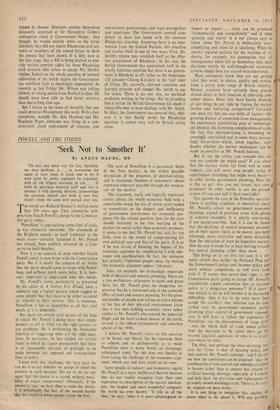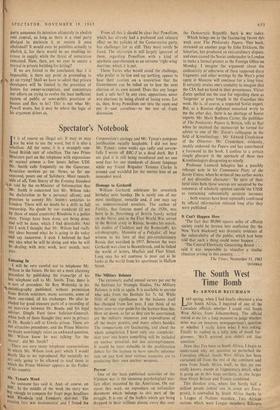POWELL AND THE TORIES
`Seek Not to Smother It'
By ANGUS MAUDE, MP
The beit and safest way for you, therefore, my dear brcthren, is . . . to re-examine the cause ye have taken in hand, and to try it even point by point, argument by argument, with all the diligent exactness ye can. . . . If truth do anywhere manifest itself seek not to smother it with glossing delusion, acknowledge the greatness thereof, and think it your best victory when the same cloth prevail over you.
THE words are Richard Hooker's, written more than 350 years ago. They summarise with precision Enoch Powell's charge to the Conserva-
tive party today. • - 'Powellism' is approaching some kind of crisis, as was ultimately inevitable. The aftermath of the Brighton speech—in itself irrelevant to the main issues—certainly hastened it. Mr. Powell has already, been publicly attacked by a Con- servative back.-bencher.
Now it is no concern of mine whether Enoch Powell conies to new terms with the Conservative party. But it is surely the concern of all Tories that the party should come to terms with PoWel- lism, and without much more delay. It is, how- ever, important to understand what this means.
Mr. Powell's views, particularly as presented by his editor in A Nation Not Afraid, have a
cohesion and a logical pattern which suggest to some people that they have to be either accepted or rejected in their entirety, This is 'nonsense. Powellism is not as monolithic as all that, and much of it is debatable.
But there are certain vital sectors of the field in which Mr. Powell is doing more than simply purport to tell us what are the right answers to our problems. He is performing the invaluable function of suggesting what are the right ques- tions. In particular, he has singled out certain issues in which he argues persuasively that there is an inescapable decision of principle to be made between two oppoSed and irreconcilable lines of policy.
Faced with this challenge, the veyy least we can do is to say whether we accept or reject the premise in each instance. Do we or do we not agree that the chdice is as stated, without possi- bility of major compromise? Obviously, if the - answer is 'yes,' we have then to make the choice; it is presumably the fear of the second hurdle that has made so many people refuse the first.
The core of Powellism is a passionate belief ill the Free Society, in the widest possible devolution. 'of the processes of decision-taking, and in maximum freedom of consumers' choice expressed wherever possible through the mechan- ism of the market.
The argument, tautly and logically expressed, covers almost the whole economic field with a remarkable sweep; but has of recent years tended to concentrate' on the dangers and inefficiency of government interference for economic pur- poses. On the related question, how far the state should intervene in the free working of the market for social rather than economic purposes, it seems to me that Mr. Powell has said far too little, even to the extent of compromising his own political case and that of his party. It is as if he was afraid of 'blunting the impact of his economic argument by complicating it with side- issues and qualifications. In fact, the omission has actually frightened people away, by making the economic argument appear 'inhuman.'
Take, for example, the increasingly important field of physical and amenity planning. There are a few perfunctory references to parks and green belts, but Mr. Powell gives the dangerous im- pression that-he is interested only in the economic effect of town and country planning. Yet the grow- ing number of people now taking an active interest in the fate of their physical environment know that it was men holding economic views rather similar to Mr. Powell's who created the industrial blight and the back-to-back houses of the north, as well as the ribbon development and suburban sprawl of the 1930s.
J believe Mr. Powell's views on this question to be broad and liberal, but he expresses them so seldom and so perfunctorily as to make Powellism seem to many Tories an alarmingly unbalanced creed. Yet this does not absolve us from facing the challenge of the economic argu- ment, which can and does stand on its own.
Some people in industry and commerce regard Mr. Powell as a mere intellectual theorist because they do not readily recognise from their own experience his description of the market mechan- iStn, 'the largest and most wonderful computer the world has ever known.' It tells us all the time,' he says, 'what it is most advantageous to import or export . . . what can be produced "economically and competitively" and in what quantity and where.' It is not always easy to know when Mr. Powell is deliberately over- simplifying and when he is idealising. When he attacks regional policies for the location of in- dustry, for example, his assumption that all managements when left to themselves take their decisions strictly by well-thought-out economic criteria simply does not accord with experience.
Most consumers know they are not getting what they want, in choice, quality and service, from a pretty wide range of British industry. Market sanctions have certainly been greatly slowed down in their function of enforcing con- sumer choice.. Have they been fatally blunted, or can things be put right by freeing the market further and 'enforcing competition'? Certainly one must try; but one can think of factors—the growing divorce of ownership from management, the enormously accelerating pace of technologi- cal advance, the increasing complications, of scale, the fact that decision-taking is becoming in- creasingly centralised and in some ways increas- ingly hit-or-miss—which, taken together, raise doubts whether the market mechanism can be made as sensitive as Mr. Powell believes.
But if, say' the critics, you concede this, do you not concede the whole case? If you allow that the market works far from well in some respects, you will never stop people trying to superimpose something that might work better-- in other words, government planning. How far is this to go? Are you not forced into corn-e, promises? In other words, is not the present system (if you can •call it that) inevitable?
This ignores the core of the Powellite doctrine. There is nothing academic or theoretical about Mr. Powell's attack on government economic planning, argued in practical terms with plenty of concrete examples. It is utterly convincing, if not incontrovertible, And if it can be shown that the decisions of central economic planners are of their nature likely to be slower, less well- informed, more' restrictive and more distorting than the operation of even'an imperfect market, then the case is made for at least moving towards less central planning rather than more.
This brings -us to our first test case. It is sir- tually certain.that neither the National Plan nor the Government's prices and incomes policy can work without compulsion, or will work even with it. If events thus prove him right, is the Conservative party going to accept Mr. Powell's conclusively argued contention that an incomes policy is 'a .dangerous nonsense'? if it does-- and refusal to do so will involve it in increasing difficulties—then it has to do even more than accept the corollary that inflation can be con- trolled only by governinent monetary policy involving strict control of government expendi- ture. It will .have to follow the arguments Of Powellism---via the phenomenon of 'wage drift' -'--into the Whole field of trade union policY. And the decisions to be taken there go far beyond legalistic questions of who is to prose- cute whom for what.
The final, and perhaps the most alarming, it case for Tories is that of housing policy and rent control. Mr. Powell contends—and I do not see how-the contention can be disputed- that the combination of rent control and subsidies attached to houses rather than to tenants has created an artificial 'homing shortage, especially in London: and held back the provision and replacement of privately owned dwellings to let. There is, he so s. no solution an these terms.
It is one thing to recognise this, another 10 • know what to do about it. Will any political
party announce its intention ultimately to abolish rent control, so long as there is a rival party pledged to maintain it or restore it once abolished? It would even be pointless actually to abolish, it, for there would be no resulting in- crease in supply while the threat of restoration remained. How, then, are we ever to secure a revival in private building for letting?
If we are forced to the conclusion that it is impossible, is there any point in pretending to go on trying? Shall we have to admit that private developers will be limited to the provision of homes for owner-occupation, and concentrate our efforts on trying to evolve the least inefficient system of public or semi-public provision of houses and flats to let? This is not what Mr. Powell wants, but it may be where the logic of his argument drives us. From all this it should be clear that Powellism, which, has already had a profound and salutary effect on the policies of the Conservative party, has challenges for us still. They must surely be faced. The electorate is still largely ignorant of them, regarding Powellism with a kind of apathetic apprehension. as an extreme 'right-wing' doctrine, which it is not,, Those Tories who would avoid the challenge, who prefer to lie low and say nothing, appear to base their caution on a conviction that the Government can be relied on to lose the next election of its own accord. Does this any longer look a safe bet? In any case, oppositions never win elections, by being, afraid of losing votes. Let us, then, bring Powellism out into the open and put it—and ourselves—to the test of frank discussion.



































 Previous page
Previous page